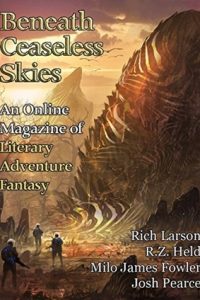Gardner Dozois reviews Gateways
Frederik Pohl is a seminal figure in the development of modern science fiction. In the course of his astounding 70-plus-year career, he’s left an indelible mark on the genre as a writer (he’s produced some of the key works of science fiction, including The Space Merchants with C.M. Kornbluth and Gateway, and has won multiple awards for his writing, including the SFWA Grand Master Award), as an anthologist (he edited the first original anthology series, Star), as an editor (of both Galaxy and Worlds of If magazines, I consider him to be one of the two most important magazine editors in genre history), as one of the field’s first agents, and as one of the founders of the whole basic tradition of SF fandom. Therefore, it’s not at all surprising that Pohl’s wife and fellow professional, Elizabeth Anne Hull, has been able to persuade 30 of Pohl’s peers – including some whose parents probably weren’t alive yet when Pohl began his professional career – to contribute work of some kind, stories (mostly original, with a few reprints), poems, appreciations, to Gateways, a festschrift (as we intellectuals call it) or tribute anthology (as the rest of you can call it) honoring Pohl’s work. Unlike the Jack Vance tribute anthology from last year, Songs of the Dying Earth, or the Isaac Asimov memorial anthology from a couple of decades back, Foundation’s Friends, Gateways doesn’t let the authors play with the worlds or characters invented by the author being honored – instead, it takes the somewhat more subjective course of encouraging authors to contribute stuff that has been ‘‘inspired by’’ Pohl’s work, which inspiration may on occasion be clearer to the authors themselves than it’s going to be to the reader (the most emotionally moving story here, for instance, Greg Bear’s ‘‘Warm Seas’’, one of the reprints, reads to me much more like a homage to Arthur C. Clarke than a homage to Pohl, whose influence on the story is not, to me, immediately apparent, although I’m sure it is to Bear).
This is a substantial anthology, good value for the money, 17 stories from top authors, the bulk of them original (although one of the reprints, David Brin’s ‘‘Shoresteading’’, takes up almost a quarter of the book!). The stories are almost all solidly entertaining, although, with one or two possible exceptions, I don’t think there are any award-winners here. The best story in the book, by a good margin, and the one that gives the strongest impression of having been centrally influenced by and in dialog with Pohl’s own work, is Cory Doctorow’s novella ‘‘Chicken Little’’, which does an excellent job of updating and commenting on some of the themes that informed Pohl & Kornbluth’s classic novel The Space Merchants. Doctorow’s updated high-tech take on Pohl’s take on Jonathan Swift’s ‘‘struldbrugs,’’ creatures who have immortality but not eternal youth, continuing to age through their extended lives, is particularly ingenious. I wouldn’t be surprised to see this one show up on an award ballot next year. Also good is Joe Haldeman’s ‘‘Sleeping Dogs’’, a deeply cynical study of ways in which future governments could manipulate the flow of information reaching their citizens even more effectively than they do today. Frank M. Robinson tells a grittier variant of James Tiptree, Jr.’s ‘‘The Last Flight of Dr. Ain’’ in a hard-eyed look at ‘‘The Errand Boy’’, Vernor Vinge grapples with the Fermi Paradox in ‘‘A Preliminary Assessment of the Drake Equation, Being an Excerpt from the Memoirs of Star Captain Y.-T. Lee’’, and Gene Wolfe takes us to an unusual setting for a compelling (although, as usual, somewhat enigmatic; I still don’t understand why there was a parade of elephants going into the spaceship in the first place) tale of what you may have to do to survive under extreme circumstances, in ‘‘King Rat’’. Plus a ‘‘Stainless Steel Rat’’ story by Harry Harrison, and work by Ben Bova, Phyllis and Alex Eisenstein, and others. In addition to afterwords about their relationships with Pohl contributed by each story author, the anthology also features appreciations by Isaac Asimov, Connie Willis, Robert Silverberg, Brian W. Aldiss, and others, plus poems by Neil Gaiman and David Lunde.








Pingback:Science Fiction
Interesting review by Gardner Dozois of “Gateways.” However, one minor comment. If my “The Errand Boy” is a variant of James Tiptree, Jr’s “The Last Flight of Dr. Ain,” it’s certainly coincidental since I am totally unfamiliar with that story.